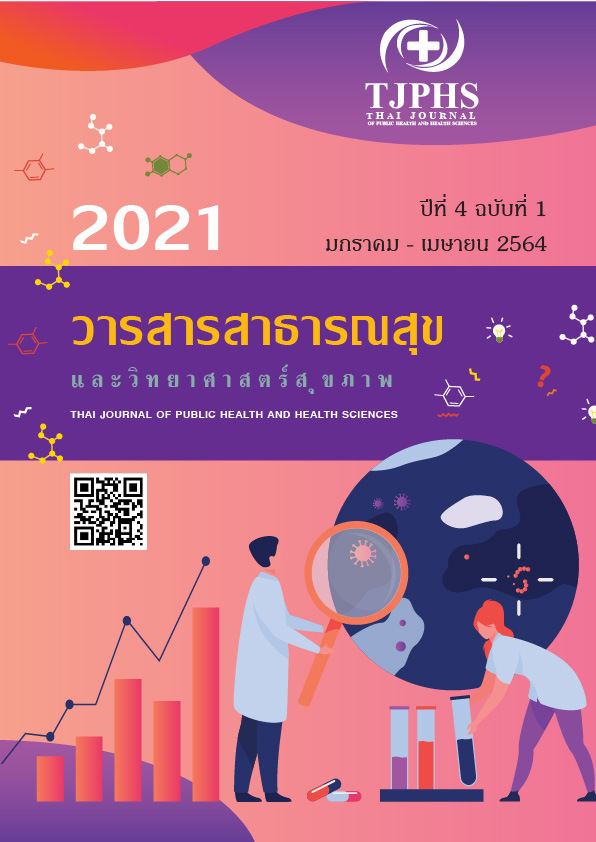สถานการณ์การจัดการปัจจัยเสี่ยงต่อสุขภาพจากสุรา ยาสูบ และสารเสพติดของชุมชน โดยใช้แนวคิดนวัตกรรมการดูแลภาวะเรื้อรัง ในจังหวัดสุราษฎร์ธานีนี
คำสำคัญ:
การจัดการปัจจัยเสี่ยงต่อสุขภาพ, สุรา ยาสูบและยาเสพติด, แนวคิดนวัตกรรมการดูแลภาวะเรื้อรังบทคัดย่อ
การศึกษาครั้งนี้เป็นการวิจัยเชิงพรรณนา เพื่อศึกษาสถานการณ์การจัดการปัจจัยเสี่ยงต่อสุขภาพจากสุรา ยาสูบ และสารเสพติดของชุมชน ตามกรอบแนวคิดนวัตกรรมการดูแลภาวะเรื้อรัง กลุ่มตัวอย่างที่ใช้ในการศึกษาเป็นผู้ที่มีส่วนเกี่ยวข้องในการดำเนินงานจัดการปัจจัยเสี่ยง ฯ จำนวน 5 ตำบล ของพื้นที่อำเภอบ้านนาสาร จังหวัด สุราษฎร์ธานี จำนวน 33 คน โดยการคัดเลือกแบบเฉพาะเจาะจง เครื่องมือที่ใช้ในการศึกษาเป็นแบบสัมภาษณ์กึ่งมีโครงสร้าง รวบรวมข้อมูลด้วยวิธีการสัมภาษณ์แบบเผชิญหน้า ผลการศึกษาพบว่า พื้นที่ทั้ง 5 ตำบล ไม่มีพื้นที่ใดที่มีการดำเนินกิจกรรมจัดการปัจจัยเสี่ยงฯ ได้ครบทุกองค์ประกอบตามกรอบแนวคิด เมื่อแบ่งเป็น 3 ระดับ พบว่า ระดับเล็ก องค์ประกอบที่ทุกพื้นที่ไม่ได้ดำเนินการ คือ การเตรียมความพร้อมในการเข้าร่วมกิจกรรมของตัวกลุ่มเป้าหมาย ระดับกลาง องค์ประกอบที่หลายพื้นที่ไม่ได้ดำเนินการ คือ การสนับสนุนและสร้างแรงผ่านภาวะผู้นำขององค์กรดูแลสุขภาพ และระดับใหญ่ องค์ประกอบที่หลายพื้นที่ไม่ได้ดำเนินการ คือ การสนับสนุนกรอบกฎหมาย และการสร้างความร่วมมือ โดยมีสององค์ประกอบที่ทุกพื้นที่สามารดำเนินการได้ คือ การส่งเสริมและการสนับสนุนของผู้นำ และการส่งเสริมจัดหาเงินทุน ซึ่งผลการศึกษาในครั้งนี้สามารถนำข้อมูลสถานการณ์ดังกล่าวมาสู่การพัฒนา และสร้างรูปแบบการจัดการปัจจัยเสี่ยง ฯ ตามกรอบแนวคิดนวัตกรรมการดูแลภาวะเรื้อรัง เพื่อเป็นข้อเสนอเชิงนโยบายให้ชุมชนนำไปประยุกต์ใช้
เอกสารอ้างอิง
Chaiyakulwathana, A., Chanthamut, C. (2012). A study of job motivation of staff nurses Internal
Medicine Department Sappasitthiprasong Hospital Ubon Ratchathani. Journal of Public
Health Nursing. 26 (3): 51-68
Chartkit-anan, A. (2014) The results of the application of a conceptual framework to manage
chronic conditions of the diabetes group. Journal of Nursing 28 (3): 112-127.
HCD. (2018). Screening and treatment for cigarette addicts. Ministry of Public Health.
Retrieved 6, 2018 from
https://hdcservice.moph.go.th/hdc/reports/report.php?source=pformated/format1.php&c
at_id=06b9ffbd9fa83f29fef3a7e7ba8119d6&id=0197da9aa711d6da186253f526d9e2a0
Institute for Population and Social Research Mahidol University. (2017) Thai Health 2017.
Nakhon Pathom: Amarin Printing and Publishing Company Limited.
Kanchanaphibunwong, A. (2015). NCDs situation report no. 2 Kick off to the goals. Nonthaburi:
Office of International Health Policy Development..
Kasemsap, W., Ngam-arun, W., Suriyawongphaisan, W., Prakongsai, P. (2013). Project to analyze
job unemployment, research on disease prevention and control Chronic contact. Office
of International Health Policy Development
Kijprasert, A., Suntayakorn, C., Noohson N., Pachanban, P. (2011). Effects of Program to Reduce
Cerebrovascular Risk among Relatives. Journal of Nursing and Health. 5 (3): 29-38. Lekfueangfu, N., Thanpanit, N., Thacharoen, K., Wongwaisiriwat S., Witworaphong, N. (2016).
The truth of the situation, 2015 alcohol consumption report in thai society. Alcohol
research center Faculty of Economics Chulalongkorn University. Bangkok: Duenthula Printing
Luecha, W., Benjawattananon, S., Pasee, K., Rukmanee, P. (2011). Development of a diabetes
care system Chaiyaphum Hospital. Journal of Nursing Division. 38 (1): 31-41.
Nuno, R. et al. 2012. Integrated care for chronic conditions: The contribution of the ICCC
Framework. Health Policy 2012 (105): 55-64.
Petchroung, N., Priyatruk, P., Thongkeang, V. (2013) The Study of Continuing Care for Patients
with Cerebrovascular Disease in Primary Care Unit. Journal of The Royal Thai Army Nurses.
(1): 25-34.
Phinyo, P., Limtrakool, P. (2014) The Health Care Situations of the Patients with Stroke in Ban Pet Sub-
District, Muang District, Khon Kaen. Journal of Nursing and Health Care. 32 (4): 122-129.
Phitthayarangsarit, S., Chotbenjamaphon, P., Pankrajang, P. (2016). Situation of Tobacco Control in
Thailand 2016. Office of Tobacco Control Department of Disease Control Ministry of
Public Health. Bangkong: Research center and manage knowledge for tobacco control
Mahidol University.
Sansern, R., Timsuwan, B., Lawang, W. (2013). The development of a care system for the disabled
by using family and community as the base. Journal of Nursing and educatio, 6(3): 25-41.
Suriyathai, C., Wongsit, S., Pankaew, S.,Wongsukpisan, M. (2011) The effect of group empowerment
on dyspnea and quality of life of patients with complicated obstructive pulmonary
disease. Journal of Public Health. 20 (2): 313-322.
Uthaiphatthanacheep, W., Khumtong, T., Ampairit, P., Ranoi, K., Jirasatsunthorn, S. (2013).
Lessons on health behavior change by community Successful. Division of Health
Education Ministry of Public Health. Nonthaburi
World health organization. 2002. Innovative care for chronic condition : building block for
action: global report. Retrieved 8, 2016
from http://www.who.int/chp/knowledge/publications/icccreport/en/.
Wuttiwongchai, P., (2017). A Guide to preventing and controlling non-communicable diseases
by communities as a Base: Reducing communities reduce chronic non-communicable
diseases. Chronic non-communicable diseases group Non-communicable diseases office
Department of Disease Control Ministry of Public Health. Nonthaburi: Emotion Art
Company Limited.
ดาวน์โหลด
เผยแพร่แล้ว
รูปแบบการอ้างอิง
ฉบับ
ประเภทบทความ
สัญญาอนุญาต
บทความทุกบทความที่ได้รับการตีพิมพ์ถือเป็นลิขสิทธิ์ของ วารสารสาธารณสุข
















